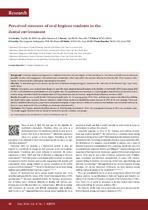Perceived stressors of oral hygiene students in the dental environment

View/
Date
2016Author
Gordon, N.A.
Rayner, C.A.
Wilson, V.J.
Crombie, K.
Shaikh, A.B.
Yasin-Harnekar, S.
Metadata
Show full item recordAbstract
University students are exposed to a multitude of stressors that may impact on their performance. The nature of health sciences education
generally involves early engagement with patients and communities, which may add to the stressors inherent to university life. There is sparse information
on stressors in the oral hygiene educational environment.
Objective. To determine perceived stressors and the level of burnout among oral hygiene students at the University of the Western Cape, Cape Town,
South Africa.
A descriptive, cross-sectional study design was used. The study sample included all students in the Bachelor of Oral Health (BOH) degree during 2012
(N=89). A self-administered questionnaire was used to gather data. Three parameters were measured, i.e. (i) demographic characteristics; (ii) perceived sources
of stress, using a modified Dental Environment Stress (DES) questionnaire; and (iii) burnout, using the Maslach Burnout Inventory (MBI).
Respondents were mostly female (74%) and primarily in the 18 - 25-year age group (92%). First- and 2nd-year students identified fear of failing
and study load as major stressors. Stressors related to a lack of basic needs were identified as major stressors by 25% of 1st-year students. Third-year
students identified clinical quotas, supervision and patients being late as major stressors. MBI scores indicated that students were not at risk for burnout;
however, most students (66.2%) scored high on emotional exhaustion (EE).
Oral hygiene students identified stressors in their learning environment. There was a progressive increase in EE across academic years.
The results suggest that interventions should be tailored for specific academic year groups.
